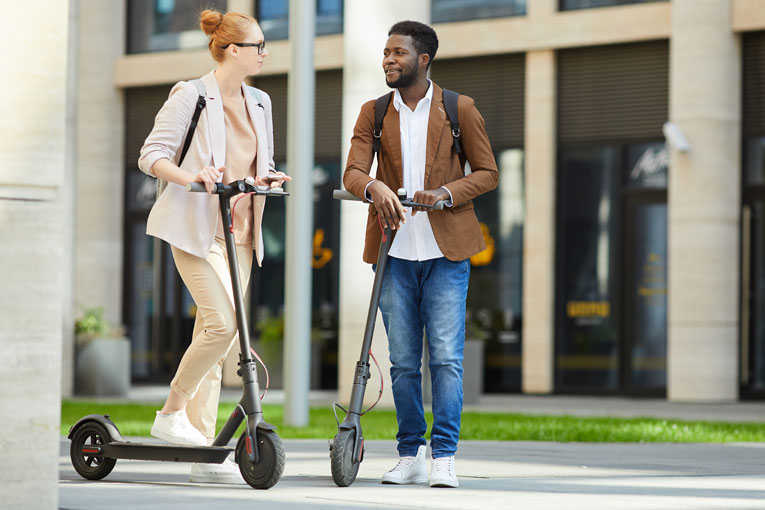Are electric scooters legal in the UK?

Electric scooters, or e-scooters, have become an increasingly popular mode of transportation. These compact, eco-friendly vehicles offer a convenient solution for short-distance travel, potentially reducing traffic congestion and carbon emissions. However, their rapid proliferation has outpaced legislation in many countries, including the United Kingdom. Given the complex legal landscape where their use is subject to strict regulations, riders are advised to seek professional legal counsel for specific situations or concerns related to e-scooter use or ownership.

Key Takeaway: How do e-scooters differ from motorcycles in the UK?
Unlock the truth about e-scooter legality in the UK and avoid potential legal pitfalls – read on to stay informed and ride smart!
Overview of electric scooters in the UK
In the UK, an electric scooter is defined as a vehicle with two wheels, a flat footboard, and an electric motor. The government is trialling their use in select areas to explore eco-friendly urban transport solutions and reduce traffic congestion. However, the legal landscape for e-scooters is complex, with significant differences between rental and privately-owned vehicles.
UK e-scooter rental trials
The UK government has sanctioned e-scooter rental trials to assess their safety and viability as a sustainable transport option. These trials are the only legal way to use e-scooters in public spaces, and operate under specific guidelines and restrictions to ensure safety and gather comprehensive data:
- Trials are active in over 30 areas, including London, Birmingham, Liverpool, and Bristol.
- Riders must be at least 16 years old with a provisional or full driving licence.
- Local authorities partner with approved operators to manage rentals.
- Helmets are strongly recommended but not legally required.
- Speed limits are typically capped at 15.5mph (25km/h).
- Rental e-scooters must meet specific safety standards.
Private e-scooters: Legal restrictions
A private e-scooter is any electric scooter not part of an official rental scheme. The legal restrictions on private e-scooters in the UK are extensive and come with significant consequences for non-compliance.
Private e-scooters face stringent legal restrictions in the UK:
- Legal use is limited to private land with owner’s permission.
- Use is prohibited on public roads, pavements, and cycle lanes.
- Modifications to e-scooters, such as increasing speed limits, are illegal.
- Police can seize illegally used e-scooters under Section 59 of the Police Reform Act.
- Insurance remains unavailable for private e-scooters, unlike mandatory insurance for rental schemes.
Penalties for illegal use are severe and strictly enforced:
- Pavement use results in a £50 fixed penalty notice.
- Riding on public roads incurs a £300 fixed penalty notice and six driving licence points.
- Careless or dangerous driving charges may apply, with fines up to £2,500 and potential driving disqualification.
- Using an e-scooter under the influence of alcohol or drugs can lead to a driving ban, unlimited fine, and possible imprisonment.
- Repeat offenders face higher fines and more severe penalties.
Future outlook for e-scooters in the UK
The future of electric scooters in the UK remains uncertain, but ongoing trials and public interest suggest potential changes in legislation. The government is closely monitoring trial outcomes to inform future policy decisions:
- Integration with existing transport networks may be explored.
- Trial period extended until May 2024 to gather more comprehensive data.
- Stricter manufacturing standards and safety features could be implemented.
- Possible introduction of mandatory insurance and registration for all e-scooters.
- Safety concerns and accident rates will significantly influence future regulations.
- Environmental impact and potential for reducing urban congestion are key factors.
- Potential legislation to legalize and regulate private e-scooters is under consideration.
Do I need a lawyer?
While understanding e-scooter laws doesn’t typically require legal representation, certain situations may benefit from professional legal advice. Consider consulting a lawyer if you encounter the following:
- Planning to start an e-scooter rental business.
- Disputing a fine or penalty related to e-scooter use.
- Advocating for changes in local e-scooter regulations.
- Charged with a traffic offense for illegal e-scooter use.
- Facing repeated violations or more serious charges related to e-scooter use.
- Involved in an accident causing injury or property damage while using an e-scooter.
- Unclear about your rights and responsibilities in a specific e-scooter-related situation.
FAQs
- Can I use a rental e-scooter if I have a foreign driving licence? Yes, most rental schemes accept valid foreign driving licences.
- Are there weight limits for e-scooter users? Yes, most e-scooters have a maximum weight capacity, usually around 100kg (220lbs), but this can vary.
- Are there restrictions on when I can use a rental e-scooter? Most schemes operate from early morning to late evening, but exact hours vary by location.
- What should I do if I’m involved in an accident while using an e-scooter? Exchange details with others involved. Take photos. Report to police within 24 hours. Contact the rental company if using a rental e-scooter.
Electric scooters present a complex legal landscape in the UK, with clear distinctions between rental and private use. As trials continue and regulations evolve, staying informed is crucial. Whether you’re a rider, pedestrian, or policymaker, understanding these laws ensures safer, more responsible e-scooter use.
Confused about e-scooter laws in the UK?
Consult a specialized lawyer through Qredible to understand your rights, avoid penalties, and ensure proper representation.
KEY TAKEAWAYS
- The UK government is conducting e-scooter rental trials in specific areas to evaluate their safety and viability as a transportation option.
- Rental e-scooters are legal only in designated trial zones, while private e-scooters remain illegal on public roads, pavements, and cycle lanes.
- Users of rental e-scooters must be at least 16 years old, possess a valid driving licence, and adhere to specific safety regulations.
- Illegal use of e-scooters can result in significant penalties, including fines, licence points, and potential vehicle seizure.
- The future of e-scooter legislation in the UK remains uncertain, with potential changes dependent on the outcomes of current trials and safety assessments.
Do you need a solicitor?
Find a solicitor on Qredible in just a few easy steps















